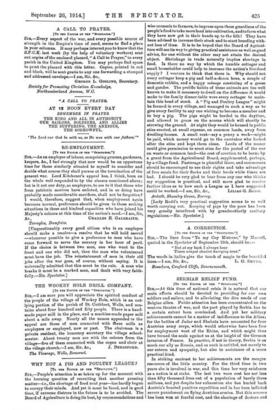WHY NOT A PIG AND POULTRY LEAGUE ET. Tall EDITOR
OF T111 "SreCTATOR.H1 SIR,—People's attention is so taken up for the moment with the burning question of recruiting that another pressing matter—i.e., the shortage of food next year—has hardly begun to occupy their minds. And yet it must be faced, and in good time, if extreme distress in the future is to be avoided. The Board of Agriculture is doing its beat, by recommendations and wise counsels to farmers, to impress upon these guardians of the people's food to take more land into cultivation, and to farm what they have now got in their hands up to the hilt! They have been advised to increase their stock and to start breeding with- out loss of time. It is to be hoped that the Board of Agricul- ture will see its way to giving practical assistance as well as good advice, for one without the other may not attain the desired object. Shrinkage in trade naturally implies shortage in food. Is there no way by which the bumble cottager and small householder could help to increase the nation's live-food supply F I venture to think that there is. Why should not every cottager keep a pig and half-a-dozen hens, a couple of domestic rabbits, and a happy menage consisting of a goose and gander. The prolific habits of these animals are too well known to make it necessary to dwell on the difference it would make to the family dinner-table were every cottager to main- tain this head of stock. A " Pig and Poultry League" might be formed in every village, and managed in such a way as to give every facility to any one wishing to become a member and to buy a pig. The pigs might be herded in the daytime, and allowed to graze on the acorns which will shortly be strewing the ground. At night they would be housed in public sties erected, at small expense, on common lands, away from dwelling-houses. A small rent—say a penny a week—might be paid, which money would go to the caretaker who looked after the sties and kept them clean. Lords of the manor could give permission to erect sties for the period of the war on waste or common land—the cost of erection to be borne by a grant from the Agricultural Board, supplemented, perhaps, by a village fund. Pasturage is plentiful there, and commoners should be encouraged to use their rights and take advantage of free meals for their flocks and their herds while times are bad. I should be very glad to hear from any one who thinks my suggestion is practical, and still more glad to receive further ideas as to how such a League as I have suggested
[Lady Rodd's very practical suggestion seems to us well worth carrying out. Keeping of pigs by the poor has been very greatly interfered with by grandmotherly sanitary regulations.—En. Spectator.]


































 Previous page
Previous page